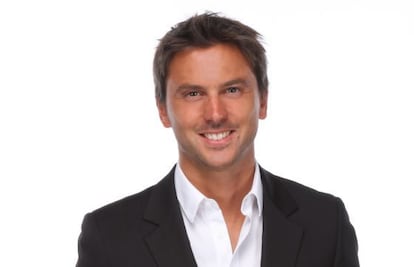“You have to know how to exploit a crisis”
The head of retailer Pixmania says he’s not scared about expanding in Spain

"My human resources director loves Spain; he can choose employees with a level of qualifications that you would never normally see," says Ulric Jerome, director of Pixmania, one of Europe's biggest online businesses. Now 34, Jerome has been running the company since he was 26. Created to sell electrical products over the internet, it has been opening stores on the streets of big European cities for several years now. In Spain, it already has five and this year, right in the middle of the crisis, it will open two more. "A crisis has its positive side, and you have to know how to exploit it," he says. "People look a lot more at the prices of things, and there we are unbeatable. We have more products than anybody else, and at the best price."
Pixmania was founded in France, but 10 years later it has an online presence in 26 countries, all in Europe. Spain is its third-biggest market, with 2.1 million customers. "Twenty percent of Spanish online buyers are Pixmania customers," he says.
In 2011 the company saw turnover of 900 million euros. Every day it sends out 100,000 deliveries to some of its 10 million customers, who can choose from almost a million-and-a-half products on its website, ranging from the latest electrical gadgets to baby strollers.
Jerome inquires about the crisis in Spain, specifically about the number of days of severance pay you need to give a laid-off worker. The outlook doesn't scare him. "My confidence in Spain is based on the fact that there is so much still to do here. Internet penetration is lower than in other countries and internet commerce even more so. It accounts for one percent of total sales, when in the UK that figure is seven percent."
Despite this, he believes that there is no tougher business than e-commerce. "Either you are very good or you are dead in months. Customers are quick to go and competition springs up everywhere. The service has to be impeccable, because thanks to the social networks, word of bad service gets around much faster and much further than bad service in the neighborhood store. That's why we have a team exclusively dedicated to comparing online prices and revising ours so that they are always the lowest. This is our reason for being — the guarantee we give to customers."
Jerome is used to taking risks. While still an economics student, he created the investment fund Sunrise — dedicated to buying and selling shares on the Nasdaq — in the middle of the dotcom bubble. After it burst, in 2000 he created ConnexionsNET, a site that brought together students and entrepreneurs.
Risk doesn't scare him. "Our competition is everyone, on the web and on the street. [Spanish department store] El Corte Inglés is [a competitor] — among other reasons because it monopolizes the stock of some products — MediaMarkt is too; and Amazon, because people go there for books, which boosts its traffic, and then the site starts suggesting other purchases."
With customers in 26 European countries, few people are better qualified than Jerome to know what Europe is. "Europe is madness. The proof is that the mighty Amazon, after so many years on the web, has only managed to open in five European countries. Europe is like this: the Germans buy according to price; the British look at the quality; the Italians pay for 80 percent of their purchases in cash; the Swedes collect their purchases in post offices and gas stations, which is brilliant for us, because if you make a home delivery and nobody's there, the profit evaporates. Spaniards are multichannel; they look on the web and buy in stores... We work with 11 currencies, 40 payment systems, 90 different taxes and 26 privacy laws. That is Europe — it's madness, but it's our madness."
Tu suscripción se está usando en otro dispositivo
¿Quieres añadir otro usuario a tu suscripción?
Si continúas leyendo en este dispositivo, no se podrá leer en el otro.
FlechaTu suscripción se está usando en otro dispositivo y solo puedes acceder a EL PAÍS desde un dispositivo a la vez.
Si quieres compartir tu cuenta, cambia tu suscripción a la modalidad Premium, así podrás añadir otro usuario. Cada uno accederá con su propia cuenta de email, lo que os permitirá personalizar vuestra experiencia en EL PAÍS.
¿Tienes una suscripción de empresa? Accede aquí para contratar más cuentas.
En el caso de no saber quién está usando tu cuenta, te recomendamos cambiar tu contraseña aquí.
Si decides continuar compartiendo tu cuenta, este mensaje se mostrará en tu dispositivo y en el de la otra persona que está usando tu cuenta de forma indefinida, afectando a tu experiencia de lectura. Puedes consultar aquí los términos y condiciones de la suscripción digital.








































